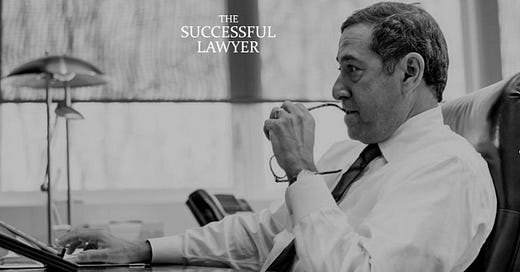I heard attorney and art historian Amy Herman speak on “the Art of Perception" at the AAML's annual meeting. Herman's lecture/workshop focused on using art as a guide to see the world more mindfully. As she points out, we need to be aware not only of what’s on the canvas but also, what’s not on the canvas.
Anyway, her presentation reminded me of David Foster Wallace’s “This is Water” fish story:
There are these two young fish swimming along and they happen to meet an older fish swimming the other way, who nods at them and says “Morning, boys. How’s the water?” And the two young fish swim on for a bit, and then eventually one of them looks over at the other and goes “What the hell is water?”
As Wallace observed, “The point of the fish story is merely that the most obvious, important realities are often the ones that are hardest to see and talk about.”
Ms. Herman alluded to this immersive blindness during her presentation. She observed that the pace of our world has accelerated sharply since the 2020 pandemic. And like Foster Wallace’s fish, we are so busy living day to day that it’s hard to really see what’s happening around us. It’s helpful from time to time to pause and explore the canvas of our lives.
It seems obvious that our sense of security has lessened since the pandemic. While I don’t believe most are even aware of it, I think we’ve unconsciously internalized a pervasive shakiness. The world just doesn’t feel as stable as it once did. This perception, of course, has been helped along by a caustic political environment and in-your-face news and information.
As a family lawyer, I see it in my practice. Instability leads to anxiety, and few things are as angst-producing as the fear of losing one’s children or money.
Pettiness and anger are more prevalent than ever. And not just with the litigants! Professionalism has devolved between lawyers as well. Some of this is attributable to a lack of mentoring, but regardless of the cause, cooperation is less forthcoming than it was pre-2020.
The advent of Zoom has been a mixed bag for me. It’s great to be able to cover a status by Zoom and a real savings for clients. But everything worthwhile has a cost. Here, the cost has been the fracture of professional relationships. Although I know that many enjoy the flexibility of working from home, the result is a decline in professional development and collegiality.
The foundation of our profession is tradition. Lawyers learned little about the practice in law school; they learned by associating with experienced mentors who showed them the way. Virtual work comes with a price: the loss of one-on-one mentoring. I’ve fought back by insisting that our lawyers primarily work in person. Physical association provides an advantage to our newer lawyers, who can model and watch our more senior lawyers manage their clients and cases. Showing up makes them better lawyers.
Technology has further destabilized our professional lives. We’re forced to embrace it, but do we understand it and use it constructively? Are we futilely fighting it or mindlessly adopting it? The pace of technological change is daunting, and the many legal practice vendors who exploit it give me a headache! AI is an excellent resource if used as a tool rather than as a substitute for critical thinking. Like any tool, technology must be used purposefully and sensibly.
But who knows what’s on the horizon? As Ms. Herman observed, one can’t see around corners. But accepting that things will continue to change rapidly is the first step. One must embrace change rather than deny it. And while one cannot peer around those corners; by paying closer attention to what’s on (and off) the canvas of life, observing the present from the perspective of the past, and applying those lessons, one can come pretty close.




Loved this one! Congrats on your AAML Award, by the way. Thanks for always sharing your hope for the profession, and your wisdom, with such clarity.
Let's collaborate?